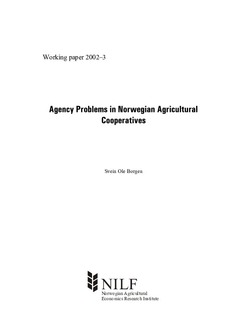| dc.contributor.author | Borgen, Svein Ole | |
| dc.date.accessioned | 2018-06-14T13:16:36Z | |
| dc.date.available | 2018-06-14T13:16:36Z | |
| dc.date.issued | 2002-01 | |
| dc.identifier.isbn | 82-7077-440-5 | |
| dc.identifier.issn | 0805-9691 | |
| dc.identifier.uri | http://hdl.handle.net/11250/2501630 | |
| dc.description.abstract | The article evaluates the usefulness and shortcomings of agency theory as a framework for discussing the future of Norwegian agricultural cooperatives. The first argument is that agency theory ignores the significance of the traditional collective thinking in Norwegian agricultural cooperatives. In this respect, agency theory is incomplete and its explanatory power is low. The second point is that, nevertheless, the value of applying agency theory as a conceptual tool may increase in the close future, due to the emerging of novel industrial strategies and new cooperative forms. Some of the crucial agencyproblems may come to the forefront, and increasingly imprint the agenda of Norwegian agricultural cooperatives. | nb_NO |
| dc.language.iso | nob | nb_NO |
| dc.publisher | Norsk institutt for landbruksøkonomisk forskning | nb_NO |
| dc.relation.ispartofseries | NILF Working Paper;2002-3 | |
| dc.subject | Agency theory | nb_NO |
| dc.subject | agricultural cooperatives | nb_NO |
| dc.subject | membership strategy | nb_NO |
| dc.title | Agency Problems in Norwegian Agricultural Cooperatives | nb_NO |
| dc.type | Research report | nb_NO |
| dc.subject.nsi | VDP::Landbruks- og Fiskerifag: 900::Landbruksfag: 910 | nb_NO |
| dc.subject.nsi | VDP::Samfunnsvitenskap: 200::Økonomi: 210 | nb_NO |
| dc.source.pagenumber | 20 | nb_NO |
| dc.source.issue | 3 | nb_NO |
| dc.relation.project | Norsk institutt for landbruksøkonomisk forskning: K020 | nb_NO |
